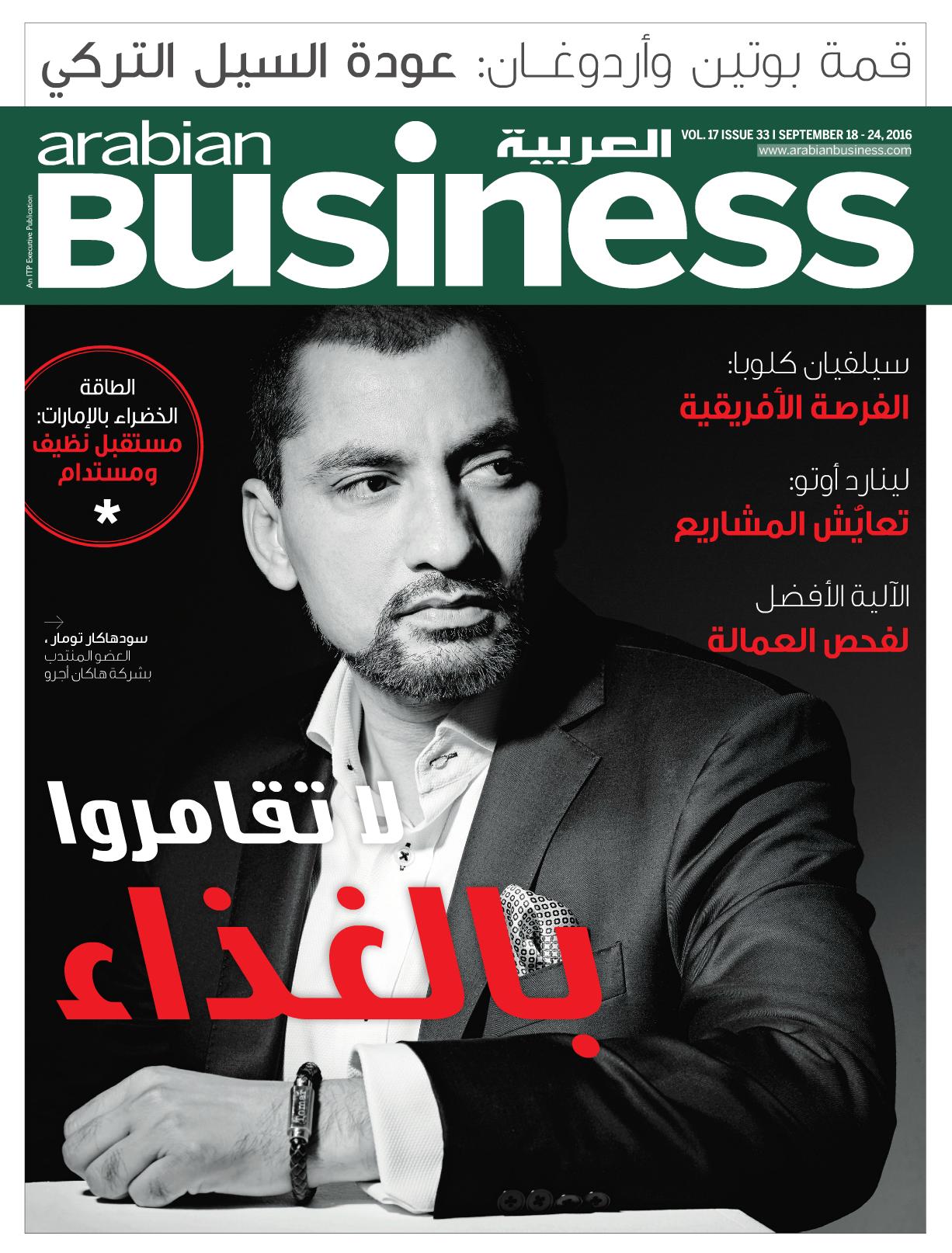
Arabian Business, Issue 33, 2016
18th September 2016
Cover story
This article originally appeared on Linkedin.
Two sentences were extensively repeated by Sudhakar Tomar , Managing Director of Hakan Agro DMCC & Chairperson of Global Pulse Confederation for fundraising & communications, throughout his interview with us saying, “Be grateful to farmers” and “Don’t gamble with food.” These two sentences are not out of the blue, as the world grapples with multiple problems directly connected to the agriculture sector. It commences with rising population, stagnant food production, impending water and food wars, which are likely be more intense than the oil and gas wars, the climate change , the rise of the food prices, wasting of food, unfair exploitation of the crops to produce Biofuel, the problems of the supply chain, dysfunctional purchasing policies of the governmental , the low income of the farmers and vulnerable agricultural crops.
Written by – Rasha Owais
- http://arabic.arabianbusiness.com/business/2016/sep/20/422203/
- http://edition.pagesuite-professional.co.uk/launch.aspx?eid=a0359b0e-de21-49cf-9db2-a285a8d7ae5e&pnum=60
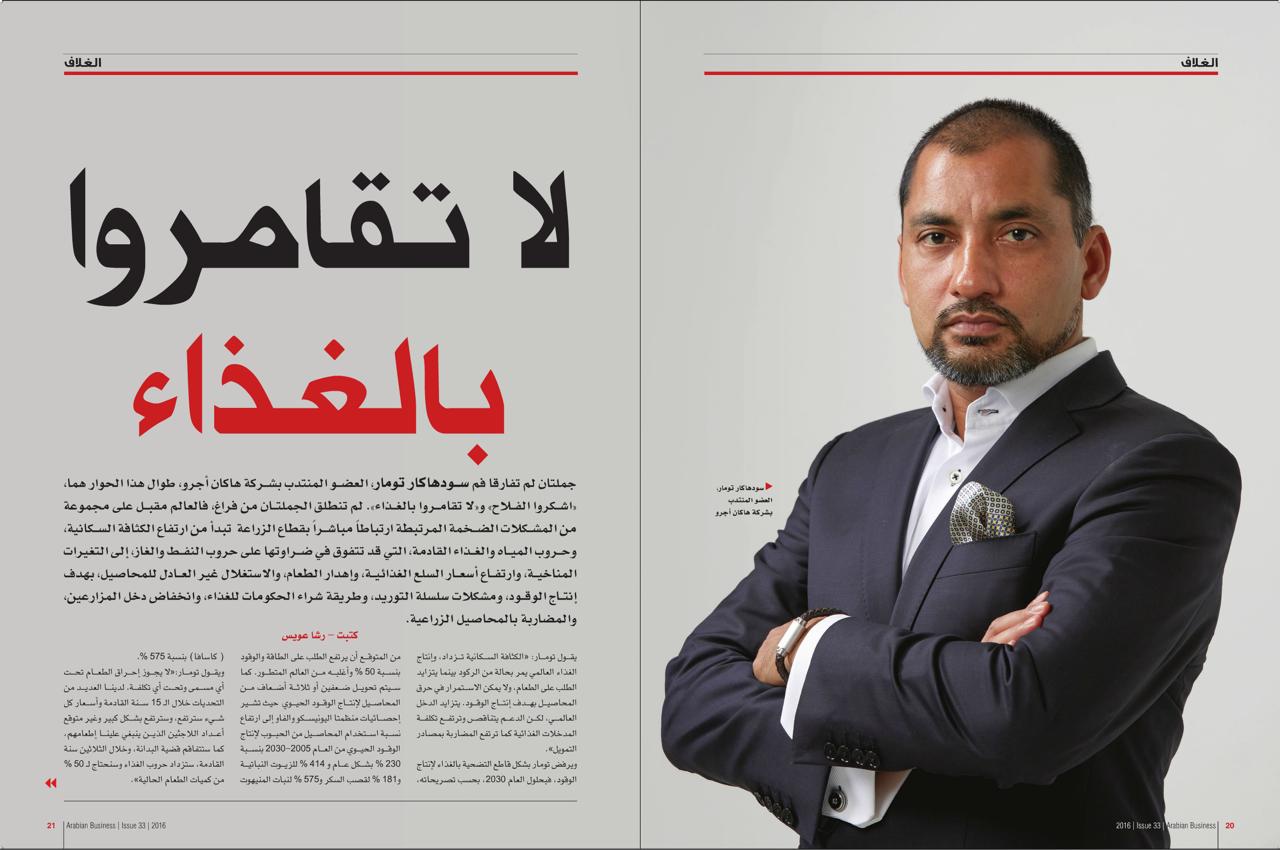
Tomar says, “Population density in vulnerable regions is on the increase, global food production is in stagnation while demand is on the increase and although world food situation seems under control but we can not continue to burn crops in the name of (bio)fuel security . Global income is increasing and subsidies are on the decline, the cost of agri inputs are increasing and there is visible lack of the liquidity .” Tomar totally dismisses sacrificing food production to generate energy, by 2030, according to him, energy and fuel demand is expected to increase by 50%, mostly engendered by developed world demand. Further, crops converted to be used in the production of biofuel is expected to double or even triple. UNESCO and FAO statistics indicates that the percentage of grain crops use in the production of biofuel during the period of 2005 – 2030 will reach 230% in general, 414% of vegetable oils, 181% of sugar cane and 575% for cassava.
Tomar says, "Food shall not be burnt under any circumstances or cost. We have many challenges within the 15 coming years and all prices are expected to increase. The number of hungry, thirsty & displaced will double to 3 billion and we have to feed them. Obesity issues will aggravate within the next thirty years and food wars will worsen and we will need 50% more of the current food quantities.
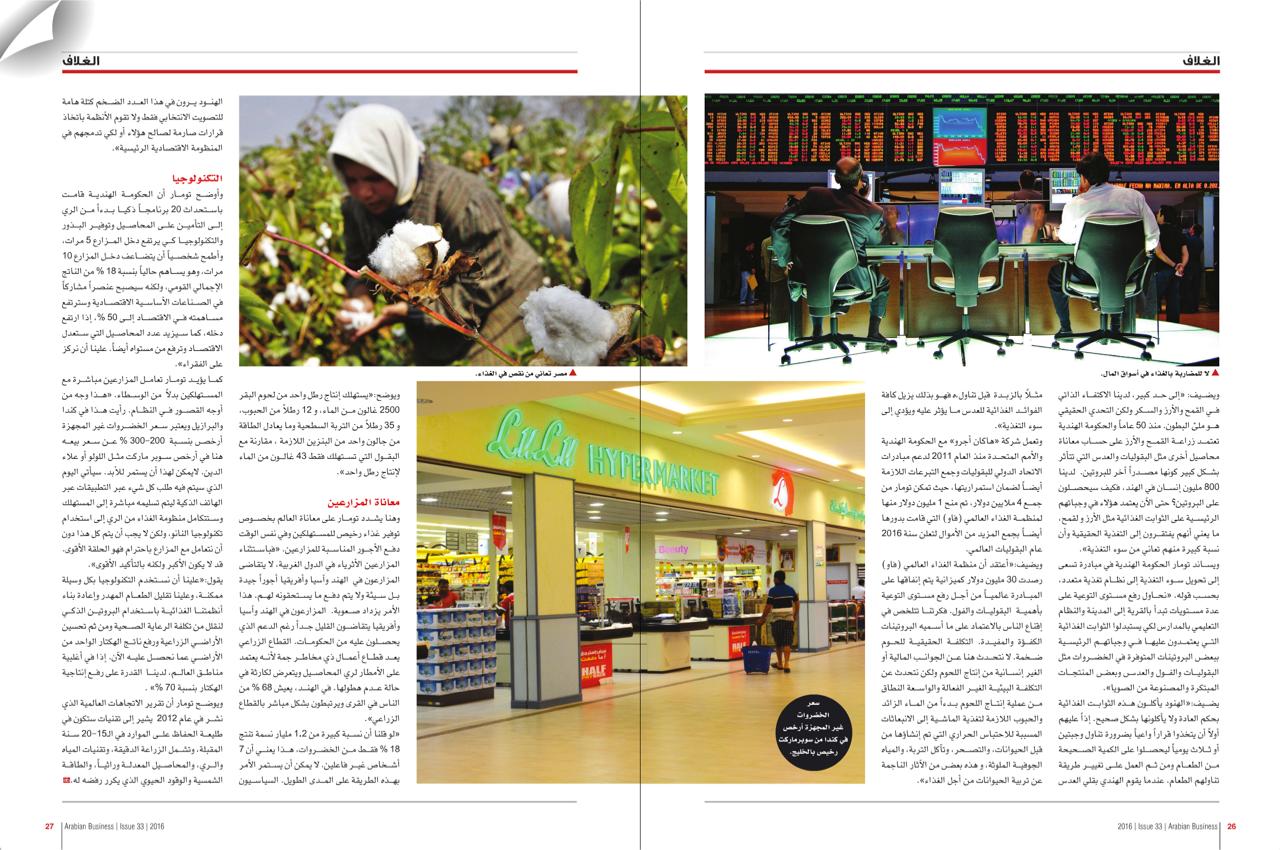
Tomar's vision of the seriousness of sacrificing food for the production of biofuel is consistent with that of the world food production and food security scientists', who consider that biofuel production is serving the interest of the rich nations and big international companies, which controls food production and supply chain, starting from seeds, fertilizers, channels of distribution all the way to the big food distributors.They also believe that biofuel adversely impacts consumers, more specifically, the poor and hinders the poor countries from importing enough food for its people. Which jeopardize the food balance of these people. Moreover, racing to produce biofuel leads to diverting water use and agricultural land from the production of food into producing raw materials to generate biofuel.International food security experts foresee the confiscation of some countries of the land of small farmers and the subsistence farmers, on grounds that it is not profit generating. In order to grant that land to foreign investors instead. It is expected that 5 million farmers will be evicted from their land to establish plantations of biofuel in Indonesia, 4 million farmers in Brazil and 4 million in Colombia. According to recent studies, it is of the view that this will threaten the lives of the native population, who live in the tropical forests, such as the original African and Indian tribes in Amazon. It’ll deprive them of the biodiversity and the natural resources which is the livelihood of those people.
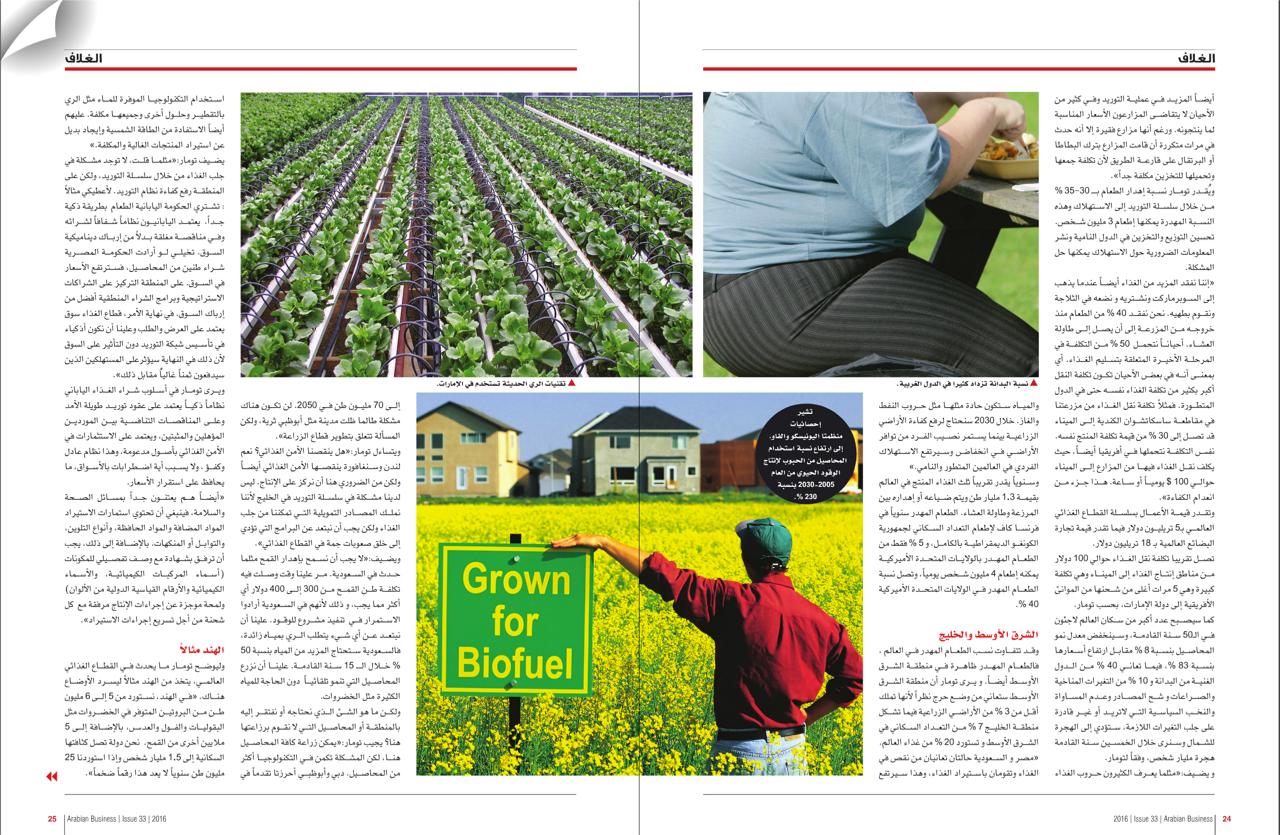
Crops Suffering
Due to climate change and other reasons, 9 to 10 crops will suffer from decline or stagnation in their growth rates in the year 2030, raising prices dramatically, for example in long term maize growth rate will decline by 12% while its price will increase by 90%, rice growth rate will decline by 23% while its price will increase by 89% and wheat growth rate will decline by 13% while its price will increase by 75%, according to statistics referred to by Tomar. By the year 2030, the size of the global economy will double, India and China will represent 40% of the global middle class consumption rising from the previous record of less than 10% in the year 2010, which will significantly alter the global food components systems.The same year will witness an increase in global water demand by more than 50%, agriculture alone will need water rates beyond what the world needs to feed its population, beside meeting the domestic and industrial needs. In the coming 15 years the need for water demand will rise by 50% while in the coming 40 years we will need to produce the equivalent of 10 thousand years of our previous production, according to Tomar.
Speculation….. Who Benefits?
The dilemma of crops is associated with speculation, productivity issues and the supply problems, so Tomar emphasizes, the need to improve crops production in Africa, Asia, and decrease food wastage in supply chain, and in Africa and Asia, rebuild our nutrition systems with smart foods such as pulses, will lead to increasing supply of the quality proteins, at affordable prices.
Tomar says, Food future suffers from speculation in unregulated or poorly regulated markets. We shouldn't risk other people's lives. Don’t disrespect farmers in India and Africa; let’s pay them more so they feed the world. Food is an opportunity in the business sector valued at $ 5 trillion, we have to promote it and guarantee its prosperity. Be Grateful for the farmer.”Tomar totally rejects the idea of gambling with people's livelihood or their homes.
He says, "Food gambling shouldn't take place. People speculate with it in countries, which suffer from food shortages and lack of regulations. Unregulated or poorly regulated exchanges must stop. Many Asian and African counties traded in wheat, rice and pulses in unregulated markets leading to disastrous results . Exchanges work well in organized and robustly regulated markets where the main objectives are price discovery and risk management however speculation in an unregulated market creates a mechanism for greed and gambling. I am against gambling with people’s food , homes and livelihood.”
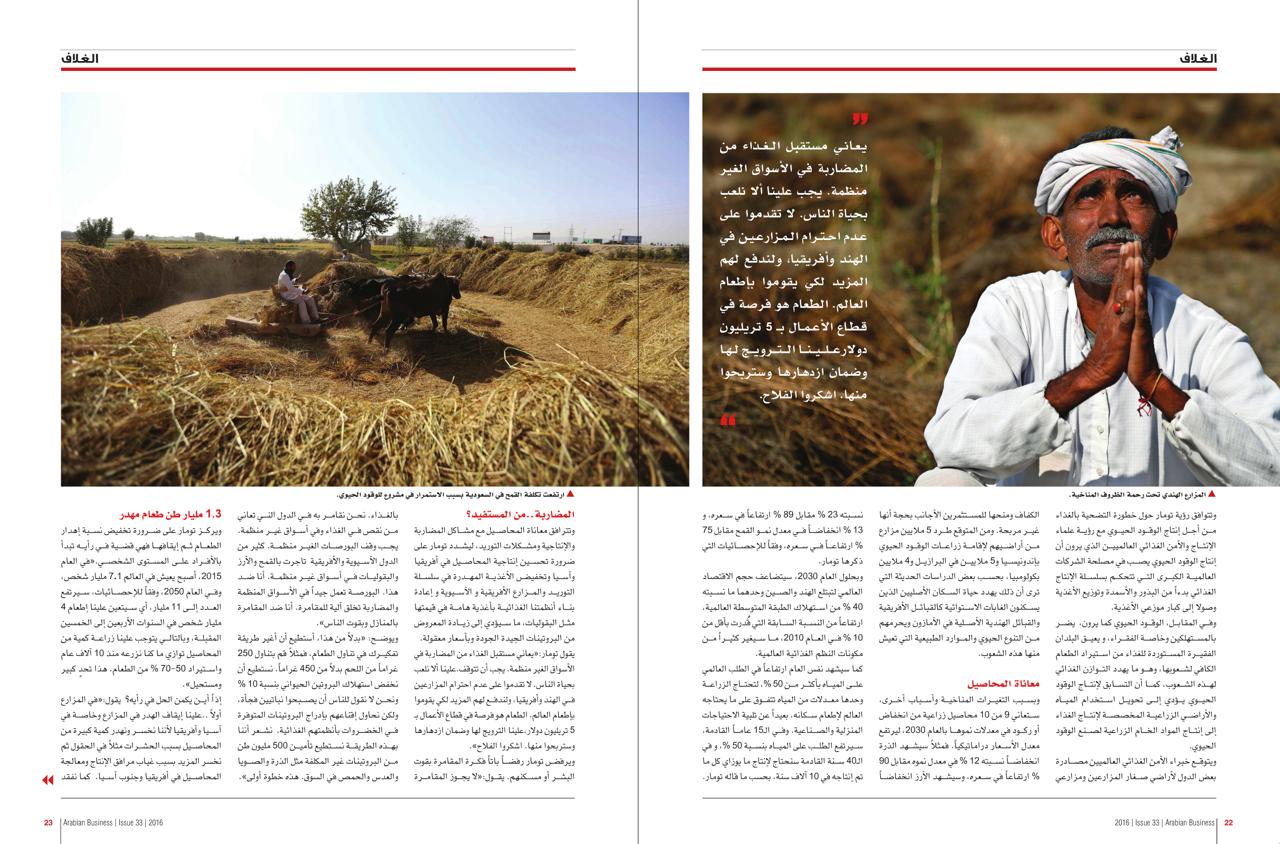
He explains saying, "Instead of this, I can change the way you think about food consumption, for example if we eat 250 grams of meat instead of 450 grams. We can reduce animal protein consumption by 10% and we need not tell people to become vegetarians overnight but bring systemic changes in the global food systems at the production and processing level . We are trying to convince processing industries and consumers to include the vegetable proteins in their diets. We feel that by this way we can secure 500 million tons of inexpensive affordable protein such as pulses, lentil, chickpeas and beans in the market. This is a first step.”
1.3 Billions Tones of Wasted Food
Tomar emphasizes on the need to reduce food wastage percentage and then stop wastage altogether, in his view it’s an issue that starts on the level of each individual. "In the year 2015, world population reached 7.9 billion, according to statistics this number is expected to grow by the year 2050 to reach 9.1 billion, thus we will have to feed 2 billion individuals more during the coming forty to fifty years, therefore, we will have to cultivate crops amounting to the equivalent of what we grew in 10 thousand years, and import 50-70% of food. This is an immense and impossible challenge.” So what is the solution in his point of view? He says, “Initially, in the farms… We have to stop wastage in the farms, especially in Asia and Africa, as we lose and waste large amount of the harvest, for example due to insects in the fields, we further lose and waste due to the lack of production facilities and crops processing in Africa and South Asia.
We further lose more in the supply process and most of the time farmers don't get paid the right prices for what they produce. Many times in farms for example in Turkey & India farmers leave potatoes or oranges on the side of the road as the cost of crop collection and storage are too expensive. Tomar estimates the percentage of food wastage through the supply chain to consumption to be around 30-35%, this percentage of wastage could feed three billion people. Improving distribution and storage in developing countries, raising awareness and publishing the necessary information about consumption can solve the problem.
We also lose more food when it goes to the supermarket and we purchase it, put it in the fridge and cook it. We lose 40% of the food from the minute it leaves the farm till it reaches the dinner table. Sometimes we bear 50% of the cost during the final stage which is food delivery. Implying that sometimes the cost of logistics is higher than the cost of food itself even in developed countries. For example, the cost of transporting food from the Canadian district, Saskatchewan, to the port could reach 30% of the value of the cost of the product itself. We bear the same cost in Africa as well, transporting food from farms to the port costs $100 per tons . This is inefficient.”
Global food supply chain business is estimated at $5 trillion, while global trade in goods is estimated at $18 trillion. The cost of transporting food from the location of production to the port in some cases reaches $100. This is a huge cost, it is five times more expensive than shipping it from African ports to United Arab Emirates, as Tomar said. The number of refugees in the coming 50 years will increase, crops rate of growth will decline by 8% compared to an increase of prices of 83%. 40% of rich countries suffer from obesity and 10% suffer from the climate change, conflicts, the scarcity of resources, inequality and political elites, who can’t or will not bring about the necessary changes. This will lead to massive migration to the north. We will observer a billion individual migration in the coming fifty years, according to Tomar.
He adds, "As many know food and water wars will be as severe as oil and gas conflicts. During 2030 we will need to increase the efficiency of the agricultural land, while the per capita of land shall continue to decline and the individual consumption shall increase in developed and developing countries. “Annually the volume of one third of food produced globally estimated to be 1.3 billion ton is wasted in the process of bringing it from the farm to the dining table. The annual food wastage in France is enough to feed the Democratic Republic of Congo population in full, while only 5% of food wastage in the United States of America could feed four million individuals a day, noting that food wastage in USA reaches 40%.
Middle East and Gulf
The degree of food wastage varies around the world. Food wastage is a phenomenon in the Middle East too. Tomar believes that the Middle East will suffer a crisis situation in theory as it has less than 3% of agricultural land, while the Gulf region constitutes 7% of the Middle East population and imports 20% of world food. "Egypt and Kingdom of Saudi Arabia suffer from food shortage, they import food, which is expected to increase to 70 million ton in 2050. There will be no issue as long as a city like Abu Dhabi remained wealthy, but the matter is related to the development of the agricultural sector."
Tomar wonders, "Are we lacking food security? Yes, London and Singapore also lack food security, but it is necessary to focus on the production. We have no problem in the supply chain in the Gulf region, as we own the financial resources, that enable us to bring food, but we must avoid programs which creates immense difficulties in the food sector." He adds, “We must not allow wastage of resources , like what had happened in Kingdom of Saudi Arabia. At a point of time the real cost of wheat reached $ 400 to $600, which was too much, due to Kingdom of Saudi Arabia pushing for continuing production . We have to avoid excessive use of water for irrigation, Kingdom Saudi Arabia will need 50% extra of water within the coming 15 years. We need to grow crops that does not need excessive irrigation, like vegetables.”
What is the thing or the crop that we need or we lack in this region? Tomar responds, "All crops can be grown here, the issue lies in the technology & cost rather than the crops. Dubai and Abu Dhabi had progressed in the use of water-saving technologies, like drip irrigation and other solutions, but such technology is expensive. They are yet to benefit from solar energy and find a substitute for expensive, high priced, imported products."
Tomar says, "As I previously mentioned there is no issue with bringing in food through the supply chain, but the region has to increase the efficiency of the procurement system. For example; the Japanese government purchases food smartly. The Japanese system is transparent and adopts a close tender approach instead of interrupting market dynamics. Imagine if the Egyptian government decides to buy two million tons of crops, the market prices will shoot up. The region has to focus on strategic partnerships and logical purchase programs rather than interrupting market dynamics. Ultimately, the food sector depends on supply and demand, we have to be smart in the establishment of the supply network without affecting market dynamics, as it will impact consumers, who will pay a heavy price.”Tomar thinks that the Japanese way of procuring food is smart, it depends on long term supply contracts, competitive tendering open for qualified and listed suppliers, it also depends on investing in food security utilizing supported assets, this makes the Japanese system a fair and efficient one, which doesn’t interrupt market dynamics, keeping prices stable. The Japanese also emphasize health and safety, import forms must include a detailed stipulation of all additives, preservatives, colors types, spices or flavorings. Further, a certificate with detailed description of all components (chemical compounds names, chemical names, international standard numbers) and a brief illustration of the production process attached to each shipment to speed up imports clearance.”
India for example
Tomar explains what is happening in the global food market, taking India as an example. "In India, we import 5 to 6 million ton of vegetable protein, like pulses, beans and lentil, in addition to another 15 million tones of edible oils and this year may be 3 million tons of wheat. We are a nation of 1.5 Billion people, if we import 25 million ton annually, this is not considered a huge number.”
He adds, "To a large extend, we are self-sufficient in wheat, rice and sugar, but the great challenge is feeding the people in a nutritional sense . The Indian government food security programme depends mostly on procurement & distribution of wheat, sugarcane & rice and it did make the country largely food sufficient but at the cost of other crops such pulses and oilseeds which are major sources of energy & protein. We have 800 million vegetarians people in India, so how will they get protein? Till now those individuals depend on components like rice and wheat for their main meals, implying that they don’t get real nutrients, thus a large percentage of them suffer from malnutrition.” Tomar supports the current Indian government in an initiative seeking to transform the malnutrition to a multi-nutrient system, as he says, “we are trying to raise awareness on many levels, starting with the village all the way to the city and the education system in schools, replacing food traditional orientation towards wheat and rice with vegetable protein like pulses, beans, lentil and some innovative products, which are made of soy.” He adds, “Indians eat traditional food out of habit and they don’t eat right. They have to make a conscious decision to eat two or three meals a day to obtain the right quantity of food and then work on changing the way they eat.
He mentioned that Hakan Agro DMCC and is working with the Indian government , multilateral bodies and the Global Pulse Confederation since 2000 for food supply chain solutions and to support the cause of Pulses industry. Hakan Agro & its leadership are always at the forefront of championing the cause of pulses industry and fundraising to ensure sustainability. Tomar managed to raise $4 million in sponsorships over a period of 8 years , out of which 1.2 million dollars was contributed to the Food & Agriculture Organization (FAO), which further raised more funds enabling the confederation to successfully proclaim at the United Nations 2016 as the International Year of Pulses . He adds, “The confederation together with FAO has a target of $ 30 million as a budget to be spent on the initiative globally in order to raise awareness regarding the importance of pulses and beans. Our idea is summarized in convincing people & processing industry with what I call ‘the sufficient and useful proteins’. The real cost of meat is huge. We are not talking about financial or inhumane aspects of meat production, but we are talking about the ineffective and wide range of environmental cost of meat production, starting with the extra use of water and grains needed to feed the animals to the toxic emissions causing global warming, which results in desertification, soil erosion, polluted groundwater, and those are only some of the effects of breeding animals for food." He explains, "one-pound production of beef consumes 2500 gallons of water, 12 pounds of grain, 35 pounds of topsoil and energy equivalent to one gallon of gasoline, while one pound production of pulses only consumes 43 gallons of water.
The Farmers Suffering
At this point Tomar emphasizes global torment when it comes to providing consumers with affordable food while at the same time paying appropriate wages to farmers. "apart from rich farmers in western countries, farmers in India, Asia and Africa don't get good wages rather they are poorly paid and they don't get the wages they deserve. This makes matters more difficult. Farmers in India, Asia and Africa receive very little pay, despite government subsides. The agricultural industry is considered a high risk business as it relies on rain for irrigation and it becomes disastrous in case it doesn’t rain. In India, 68% of the population lives in villages and they are directly connected to the agricultural industry.”
Technology in India
Tomar explained that the Indian government developed 20 smart programmes ranging from irrigation to crop insurance, providing seeds and technology in order to increase the farms income by 5 multiples. “I personally aspire and dream to increase the farmer income by 10 times . The farmer currently contributes just 18% to the gross domestic product (GDP), but if his income is to increase, he will become an integral participant in the industry and the economy increasing that 18% GDP contribution to 50%. Further, number of crops will increase, which will reform the economy and raise its value. We have to focus on the poor.”
Tomar also supports direct relationship between the farmers and the consumers, irradiating middlemen. "This is one of the shortcomings of the system. I saw this in Canada and Brazil. The unprocessed vegetables' price is considered cheaper by 200-300% of the selling price here in the cheapest supermarket, such as Lulu or Aladdin. This can't continue forever. The day will come when everything shall be requested through smart phone application to be delivered directly to the consumer and the food system from irrigation to nanotechnology shall be integrated, but all this cannot materialize without dealing with the farmer with respect, as he is the strongest link. He may not be the biggest but certainly the strongest. Tomar further illustrates that the ‘world trends’ report published in 2015 indicates to technologies that can preserve resources in the coming 15 – 20 years that includes precision farming, water and irrigation technologies, genetically modified crops, solar energy and biofuel - and he firmly repeats his rejection biofuel.
In summary he says, “We have to use technology in every possible way , we have to reduce food wastage, rebuild our nutrition systems using smart protein to reduce the cost of health care that could allow us to improve the agriculture land In most areas of the world and finally he adds “ If we do things the right way we could increase the supply & productivity of each hectare by 70% within our lifetime.
Interview by – Rasha Owais
Sudhakar Tomar is the Managing Director of Hakan Agro DMCC an agricultural & food systems supply chain multinational based in Dubai (UAE) exporting over 3 Million MTs of Agri Commodities valued at about $ 1.5 Billon from 55 countries to over 1000 customers in 100 countries. Tomar , a multiple awardee notably “ Business Leader of the Year (2016)” from DMCC - Government of Dubai , “Forbes Top Indian Leaders in the Arab World (2016) ,Arabian Business Indian CEO (2016) for CSR in the field of reducing Malnutrition and advocating farmers rights , “International Pulse Man of the Year Award (2015) from Global Grain Food & Feed Forum “ and “ Grain Asia Award (2006) in World Commodities Forum , is also the Founding Member & Honorary Chairperson (Communications & Sponsorships) of Global Pulse Confederation which represents over 800 Million farmers producing 70 million tons of pulses production in 50 countries, valued at US$ 100 billion. He is also the President of “ India Middle East Agro Trade Investment & Investment Forum ( IMEA-TIIF) ” and the Board Member of Dubai Food Trade Advisory Group of DMCC (Government of Dubai), The CXO Alliance , Dubai and Non Profit Krishna Education Foundation, India. With over 24 years of supply chain experience and keen interest in Rural Poverty Alleviation, Food Security and Reducing Malnutrition he has raised over US$ 4 million in sponsorships and donations for various initiatives .As an Entrepreneur, Farmer and Food Systems Thought Leader Sudhakar Tomar has made over 100 speeches on critical themes of Water-Food Energy nexus, Malnutrition ,Food Security, Global Pulses Trade, Integration of Supply Chains, and Future of Food Trade in various global conventions. He continues to promote pro agriculture trade barriers free global agri business and the need for humane pro-agri and pro farmers CSR in Asia & Africa.